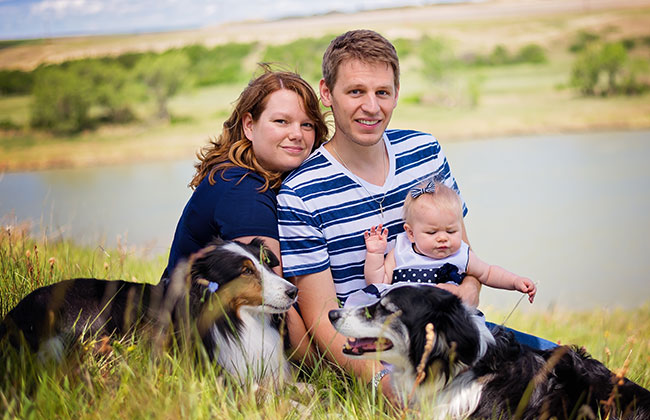Caring for creation isn’t just for agrologists. It’s for all of us.
By Lee Moltzahn
The prairies of southern Alberta are my home.
Growing up, I spent a lot of time on my grandparents’ farm near Fort Macleod, where they raised Angus cattle. My grandma often took my brothers and me for walks in the pastures on the farm to search for wildflowers and fruit. Every spring, we looked forward to the first magenta flowers of the pincushion cacti. After the first fall frost, their ripe berries tasted like kiwis. My grandpa would point out the endangered ferruginous hawks and tiger salamanders.
Native grasslands are an endangered ecosystem across the globe, even here in Canada. To put this in perspective, these areas are shrinking faster than the Amazon rainforest. In Alberta, only a third of our native prairie remains in a relatively natural state. Yet these same prairies are home to 75 percent of the species in Alberta that are at risk.
I work as an agrologist (translation: plant nerd) for a conservation group. Working with ranchers and other landowners, I make grazing recommendations that benefit both the land and species at risk. Deferred grazing techniques and pasture rotation allow the land to rest, improving the health of native rangelands and the quality of habitat for many grassland creatures.
God gives us a responsibility to care for his creation with which we have been entrusted: “Then God said, ‘Let us make humankind in our image, according to our likeness; and let them have dominion over the fish of the sea, and over the birds of the air, and over the cattle, and over all the wild animals of the earth, and over every creeping thing that creeps upon the earth’” (Genesis 1:26). Because of my work, I do this daily, but you can care for creation no matter your occupation. Educating yourself about your natural landscape is a good start. Get outside and attend outreach events hosted by your local stewardship and watershed groups. It’s hard to appreciate something you don’t have a connection to.
I’m trying to instill this appreciation in my two-year-old daughter. My wife and I own a small farm along the Oldman River, and my daughter often accompanies me on walks in our coulees, the valleys that run through our land. I hope she comes to love and care for the prairies as I have.
Lee Moltzahn is a member of Monarch Reformed Church in Monarch, Alberta.





